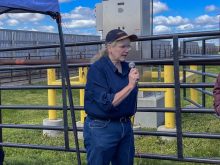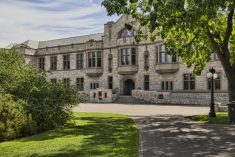Memorial services will be held “at a later date” for renowned Prairie animal science professor Charles “Red” Williams, who died Monday at age 93 leaving a legacy of work in livestock care and ag extension.
Williams, born in Regina and raised on farms in Saskatchewan and Alberta, served in the Second World War on the HMCS Sioux, credited as the first Allied ship to approach Juno Beach on D-Day.
Returning to his education after the war, Williams studied at the University of British Columbia and Oregon State University, specializing in genetics, and by 1954 joined the University of Saskatchewan as an assistant professor of animal science.
Read Also

B.C. ostriches culled, CFIA confirms
Ostriches on an embattled Edgewood, B.C. farm have been culled after a prolonged legal battle, the Canadian Food Inspection Agency has confirmed.
By 1965 Williams was a full professor and senior extension specialist, and headed the university’s animal and poultry science department from 1975 to 1983.
During his career at U of S, Williams’ leadership on animal care “resulted in continual upgrading of federal legislation on the handling and transporting of livestock,” according to the Saskatchewan Agriculture Hall of Fame, into which he was inducted in 1996.
Williams “supervised students in studies of windbreaks, overhead shelters and straw bedding in support of the growing feedlot industry,” the hall of fame said, also noting his studies on the effects of loose housing on dairy cattle, differences of hair coats of beef breeds, and nutrition for bison.
The hall noted Williams risked unpopularity when publicizing dwarfism in beef cattle and that he took criticism “initially” for statements he made on crossbreeding and the Crow rate for grain transportation.
According to his family, in his obituary in the Saskatoon Star Phoenix, Williams “travelled the highways and back roads of Saskatchewan as well as around the world” and “was incredibly generous of his time and expertise,” visiting almost two dozen countries on technical aid missions.
At home, Williams also promoted commercial agriculture on Saskatchewan’s reserves and in 1970 became a special advisor to the Federation of Saskatchewan Indians (now the Federation of Sovereign Indigenous Nations), later helping develop the Saskatchewan Indian Agricultural Program.
Williams also took a prominent role in the Saskatchewan wing of the federal Liberal party, running three times as a candidate in the Saskatoon area, where he was defeated by the Tories’ Ray Hnatyshyn (1979, 1980) and the NDP’s Stan Hovdebo (1988).
Williams was also known for his “colourful speaking style” at hundreds of farmer conferences, the hall said; he also produced newspaper columns and daily radio segments under the name “Food for Thought.” After retirement he remained a professor emeritus and kept an office at the U of S up until age 89.
Williams was named to the Order of Canada in 1988, the Saskatchewan Order of Merit in 2002 and, for his wartime service, France’s Legion of Honour in 2016. He was also named a fellow of the Agricultural Institute of Canada in 1972 and a life member of the Canadian Society of Extension in 1970, and received the Diamond Jubilee medal, Golden Jubilee medal and Confederation Medal.
The Order of Canada, in inducting Williams as a member, said his “dedication and participation in the productive improvement of one of our most important industries has been a source of inspiration and encouragement to all those working in the field.”
A celebration of Williams’ life “will take place at a later date,” his family said in his obituary. Memorial donations can be made to the Sherbrooke Foundation or to the Saskatchewan branch of the Kidney Foundation of Canada. –– AGCanada.com Network














